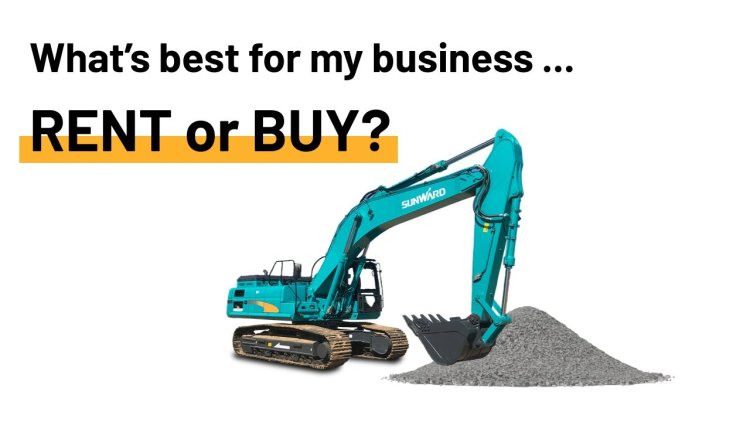Excavator Rental vs. Purchase: What’s the Better Option?
This article will explore the pros and cons of renting versus purchasing an excavator to help you make an informed decision for your construction needs.

Excavators are essential pieces of equipment in construction, excavation, and landscaping projects. Whether you need to dig trenches, demolish structures, or move large quantities of earth, an excavator can significantly enhance productivity. However, one of the biggest decisions that businesses and contractors face is whether to rent or buy an excavator. Both options have their benefits and drawbacks, and the right choice depends on various factors such as budget, project duration, frequency of use, and maintenance considerations.
This article will explore the pros and cons of renting versus purchasing an excavator to help you make an informed decision for your construction needs.
Understanding Excavator Rental
Advantages of Renting an Excavator
-
Lower Initial Cost: One of the primary reasons contractors choose to rent an excavator is the lower upfront cost. Purchasing an excavator requires a significant capital investment, while renting allows businesses to access equipment without large financial commitments.
-
Flexibility: Renting an excavator provides the flexibility to select different models based on the specific needs of each project. This is particularly beneficial for businesses that handle diverse construction tasks.
-
No Long-Term Maintenance Costs: Rental companies handle the maintenance and repair of the equipment, saving contractors from expensive upkeep.
-
Access to the Latest Technology: Rental companies regularly update their fleet, meaning renters can access the latest models with advanced features, increasing efficiency and productivity.
-
No Depreciation Worries: Purchasing an excavator results in depreciation over time, affecting resale value. Renting eliminates this concern.
-
Storage Convenience: Excavators require secure storage when not in use. Renting eliminates the need for permanent storage space.
Disadvantages of Renting an Excavator
-
Higher Long-Term Cost: While renting is cost-effective for short-term use, it can become expensive over long periods. Businesses with frequent excavation needs may spend more on rentals than they would on purchasing.
-
Limited Availability: During peak construction seasons, rental excavators may be in high demand, making it difficult to secure the right equipment when needed.
-
Usage Restrictions: Some rental agreements may have usage limitations, such as hourly caps or geographic restrictions.
Understanding Excavator Purchase
Advantages of Buying an Excavator
-
Long-Term Cost Savings: While purchasing requires a higher initial investment, it becomes more cost-effective for companies that need an excavator regularly.
-
Ownership Benefits: Owning an excavator means there are no restrictions on how or where it can be used, giving businesses full control over their equipment.
-
Availability: Having an excavator on hand eliminates the need to wait for rental availability, ensuring uninterrupted workflow.
-
Potential for Resale: Excavators hold some resale value, allowing owners to recover a portion of their investment when they decide to upgrade or sell.
-
Customization: Owners can modify or add attachments to their excavators according to their project needs, something rental companies may not allow.
Disadvantages of Buying an Excavator
-
High Initial Investment: Purchasing an excavator requires a substantial financial outlay, which may not be feasible for small contractors or businesses with limited capital.
-
Maintenance and Repairs: Owners are responsible for routine maintenance, repairs, and part replacements, leading to additional expenses.
-
Depreciation: Over time, the value of an excavator decreases, affecting the resale price.
-
Storage and Transportation Costs: Excavators require secure storage and specialized transportation for moving between job sites, adding to ownership costs.
Key Factors to Consider When Choosing Between Renting and Buying
1. Project Duration and Frequency of Use
-
If you require an excavator for a short-term project, renting is the better option.
-
If your business frequently uses an excavator for ongoing projects, purchasing may be more economical in the long run.
2. Budget Constraints
-
Renting allows businesses with limited capital to access high-quality equipment without large upfront expenses.
-
Purchasing requires significant investment but can save money over time for businesses with regular use.
3. Maintenance Considerations
-
Rental companies handle maintenance, reducing operational costs for renters.
-
Owners must budget for repairs, servicing, and part replacements, which can be costly.
4. Equipment Availability
-
Renting may pose availability challenges during peak seasons.
-
Owning an excavator ensures access whenever needed.
5. Project Location and Mobility
-
Renting is ideal for businesses that frequently operate in different locations since they won’t have to transport heavy machinery.
-
Owners must account for transportation costs and logistics when moving equipment between job sites.
6. Tax and Depreciation Benefits
-
Rental costs are often tax-deductible as an operational expense.
-
Purchased equipment may offer depreciation deductions, benefiting businesses in the long run.
When to Rent an Excavator
-
You have a short-term or one-time project.
-
You need different types of excavators for varied tasks.
-
Your business has limited storage space.
-
You want to avoid maintenance responsibilities.
-
You need access to the latest models without making a purchase.
When to Buy an Excavator
-
Your business requires an excavator frequently.
-
You want to avoid rental availability issues.
-
You have the budget for a long-term investment.
-
You seek full control over your equipment and its usage.
-
You prefer customization and attachment flexibility.
Conclusion
Choosing between renting and purchasing an excavator depends on several factors, including project duration, budget, maintenance considerations, and equipment availability. Renting is an excellent option for short-term projects, businesses with limited capital, and those looking to access the latest models without maintenance hassles. On the other hand, purchasing is a cost-effective choice for companies with frequent excavation needs, as it provides long-term savings and ownership benefits.
Whether you need a standard excavator for large-scale construction or a walk behind mini excavator for precise tasks in confined spaces, evaluating your specific needs will help you make the best financial and operational decision. By carefully assessing the advantages and disadvantages of each option, you can ensure optimal efficiency and cost-effectiveness for your construction projects.
What's Your Reaction?



















